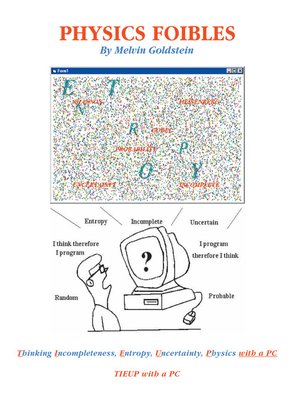
Sign up to save your library
With an OverDrive account, you can save your favorite libraries for at-a-glance information about availability. Find out more about OverDrive accounts.
Find this title in Libby, the library reading app by OverDrive.



Search for a digital library with this title
Title found at these libraries:
| Loading... |
The science of Physics is based on observations that lead to the formulation of mathematical relationships between measured quantities. Some would consider Physics an exact science. Its discoveries and laws are basic to understanding in all areas of science and technology.
Four Physics foibles
1) Kurt Godel proved that there are unknowables in our mathematics.
2) Werner Heisenberg showed that there are uncertainties in our measurements.
3) Entropy says that we can only predict the probabilities of events.
4)Chaos Theory deals with things that are effectively impossible to predict like turbulence and long term weather forecasting.
The word foible as defined by Webster:
An odd feature or mild failing in a person's character
a weakness.
In fencing,
the weaker part of a sword blade.
It is the acceptance of these foibles in Physics that has led to broader understanding. In the process of examining these 'weaknesses' in science, many creative and practical solutions have been discovered.
There are a number of original computer programs throughout the book. No other person, living or dead - other than the author - has edited or examined the programs. No effort has been made to optimize any of these programs. The author has relied on the computer's results to serve as his default editor.
Computer programs are included that take you through puzzles and paradoxes, distribute molecules, follow ameba populations, prove and disprove Murphy's Law, flip coins, and play lottery and casino games.
Many have asked about the book. Some with a technical background - and some not - have questioned: What do dice, poker, lotto, and heads-or-tails have to do with Physics?
The mathematical study of games of chance is as old as mathematics itself. The connection between games of chance and Nature's laws can be rigorously refined in the field of Statistical Mathematics. If you can analyze multiple coin flips, you can view molecular distribution. If you can understand the results of a game of Roulette, you can understand Radioactive decay.
Also included are polls, number systems, wave packets, the search for Pi and the elusive Random, Internet quotes, and more. And in the the process of reading, stop and listen to the words of the science gurus displayed in cartoons throughout.






